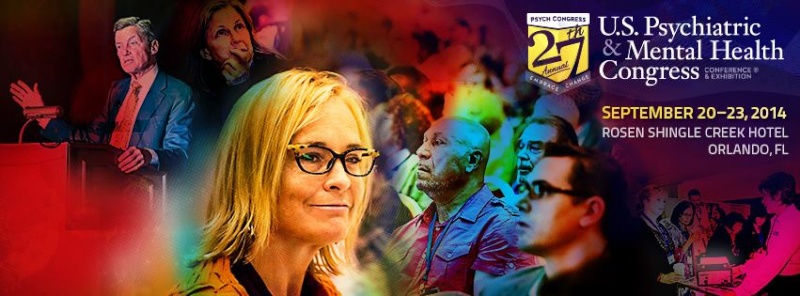
Search
Statistics
We have 222 registered usersThe newest registered user is raheelmemon
Our users have posted a total of 1140 messages in 613 subjects
If you are seeing this, you have attempted to link to the UpToDate widget but are experiencing a problem. Please visit UpToDate for more information.

U.S. Psychiatric and Mental Health Congress 2014 Meeting- Notes
FORUM FOR PSYCHIATRY RESIDENTS :: Psychiatry :: Psychiatry-Neurology-Psychology discussion :: Psychiatry In Depth
Page 1 of 1
 U.S. Psychiatric and Mental Health Congress 2014 Meeting- Notes
U.S. Psychiatric and Mental Health Congress 2014 Meeting- Notes

Hi Friends.
I recently attended the U.S. Psychiatric and Mental Health Congress 2014 meeting (Sep 20-23, 2014).
Here are the important notes taken from various lectures held during this meeting.
(1) Naltrexone for Alcohol Dependence
- Primarily for more complex and severely dependent patients (note: high alcoholism risk is associated with LOW b-endorphin levels)
- Mechanism of action:
(a) Naltrexone raises b-endorphin (through feedback inhibition) via PRESYNAPTIC opioid receptors.
(b) Naltrexone reduces alcohol stimulation and craving by maximal b-endorphin stimulation of POSTSYNAPTIC u-opioid receptors.
(c) By this above mechanism b-endorphin levels are maximized --> alcohol cannot further raise b-endorphin OR increase u-opioid receptor stimulation --> thereby reducing “high” and priming effect from alcohol.
(2) Attenuated Psychotic Disorder Syndrome
- 400 fold increase risk of developing psychotic disorder by next year
- 30% of patient will develop psychotic disorder in their lifetime
- Do not routinely use antipsychotics in this disorder (*)
- Monitor closely
- Instruct patients to avoid marijuana use
- Treat co-morbidities effective
- Omega 3s and other treatments still experimental
(3) Treatment of Persistent Aggressive Behaviors in Schizophrenia
- Second-generation antipsychotics (best evidence): Clozapine > Olanzapine > Haloperidol
- Beta-blockers (second-best evidence)
- Mood stabilizers (weak evidence)
- Antidepressants (weak evidence)
- Benzodiazepines (negative evidence)
(4) Bipolar disorder type II vs Borderline Personality Disorder
Factors Suggesting Bipolar Disorder type II:
Family history of bipolar disorder or major mood disorder
Clear onset
Failure to remit
Melancholic, agitated and mixed features when depressed
Uncharacteristic euphoria, creativity, grandiosity
Autonomous mood swings
Response to mood stabilizers
Increased rate of ADHD
Factors Suggesting Borderline Personality Disorder:
Family history of antisocial personality disorder, substance use disorder and unipolar depression.
Depressed entire life
Attenuated over time
Blames others. Cognitive symptoms of depression
Reactive moods, generally triggered by interpersonal events
Impulsivity to manage negative affect
Rarely remits on mood stabilizers
Non-Differentiating Factors:
Atypical features
Suicidality and self mutilation
Childhood trauma
Co-morbidity with anxiety and substance use disorders
(5) Which Symptoms Do Not Differentiate between ADHD and Bipolar Disorder?
- Rapid speech
- Distractibility
- Increased energy
(6) Treatment of ADHD and Comorbid Bipolar Disorder
- Treat bipolar symptoms first, if ADHD symptoms persist, titrate medications carefully
- It may be safe to use stimulants if bipolar symptoms responded well to a mood-stabilizing agent
- Some evidence suggests that atomoxetine can be used safely and effectively in combination with mood stabilizers
- Stimulant use requires ongoing monitoring as it may destabilize the mood disorder
- Positive or negative response to a trial with a stimulant medication should not be used as a diagnostic tool in the process of differential diagnosis.
(7) Preferred medications for patients with Insomnia and history of substance use
- Ramelteon
- Low dose Doxepin
- Trazodone
(8 ) Management of Behavioral and Psychological Symptoms of Dementia
- Atypical antipsychotics are first-line for emergencies (out of control patient) to prevent harm to patient/others
- If patient is psychotic, determine lowest maintenance dose of preferred agent
- Always discuss risk/benefit ratio of using atypicals with family/caregivers and document in chart
- If atypicals are required for tranquilization, always attempt prompt weaning and discontinuation
- If atypicals are used for psychosis, consider 12-month treatment before attempt at weaning/discontinuation
- Calming antidepressants such as trazodone may be useful for mild agitation
- Calming antidepressants such as citalopram may useful for agitation associated with depression
- Anticonvulsants such as oxcarbazepine and divalproex may be useful for impulsive aggressive behaviors; levetiracetam, gabapentine, and lamotrigine are not useful for agitation/aggressivity
- Sexually aggressive behaviors may respond to the anti-libidinal effects of SSRIs, or in severe cases, to conjugated estrogen or medroxyprogesterone
- As with all pharmacotherapies in the elderly, “start low and go slow”
(9) Postpartum intrusive thoughts of harming the baby:
OCD Vs PSYCHOSIS:
OCD:
- Intrusive thoughts causes distress (ego dystonic)
- Fear of acting on intrusive thoughts, avoidance behaviours/rituals
- Low likelihood to act
PSYCHOSIS:
- Not associated with distress (ego syntonic)
- Often associated with symptoms of psychosis (auditory hallucinations, confused, agitated, loss of reality etc)
- Increased likelihood to act
 Similar topics
Similar topics» Bipolar Depression Update: 25th Annual US Psychiatric and Mental Health Congress
» Connections to Outpatient Mental Health Care of Youths With Repeat Emergency Department Visits for Psychiatric Crises
» Promoting Mental Health- Report by WHO
» Sudden Deaths in Psychiatric Patients
» QuantiaMD: " Psychiatry- Primary Mental Health".
» Connections to Outpatient Mental Health Care of Youths With Repeat Emergency Department Visits for Psychiatric Crises
» Promoting Mental Health- Report by WHO
» Sudden Deaths in Psychiatric Patients
» QuantiaMD: " Psychiatry- Primary Mental Health".
FORUM FOR PSYCHIATRY RESIDENTS :: Psychiatry :: Psychiatry-Neurology-Psychology discussion :: Psychiatry In Depth
Page 1 of 1
Permissions in this forum:
You cannot reply to topics in this forum

» L-Methylfolate: Who Will benefit
» Vitamins & Supplements in Clinical Practice.
» Imaging Biomarkers for Outcomes in Mild TBI
» Q.5 Clozapine Neutopenia
» Treating Disorders!
» Cortical Abnormalities in Adults & Adolescents with MDD
» Efficacy of Antipsychotics in Pediatric Acute Mania
» Obsessive Compulsive Disorder in Adults: Which Treatment is Better?